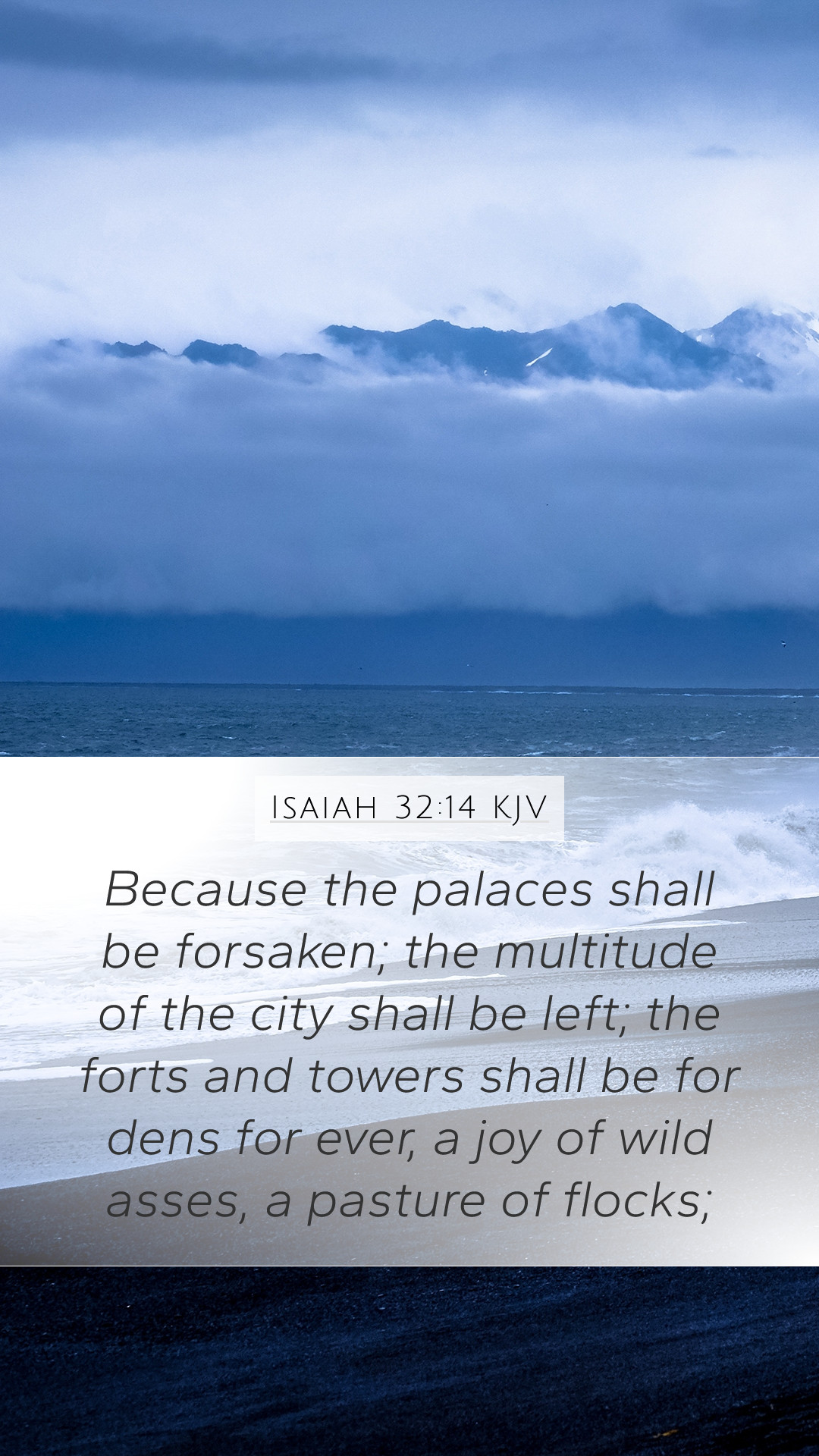Exploring the Meaning of Isaiah 32:14
Isaiah 32:14 states, "For the palace shall be forsaken; the populous city shall be deserted; the fortress and the tower shall become dens forever, a joy of wild asses, a pasture of flocks." This verse offers a profound insight into the consequences of sin and the impending judgments from God upon His people. We delve into its meanings through the lens of public domain commentaries, providing a comprehensive Bible verse interpretation.
Bible Verse Meanings
According to Matthew Henry, this passage reflects the desolation that comes upon cities when they turn away from God. The forsaking of palaces indicates a significant loss of stability and leadership among the people. It shows how the once vibrant and populated cities become echoes of their former glory when they fall into disobedience. This passage serves as a warning of the spiritual decline that often precedes physical desolation.
Albert Barnes elaborates that the imagery of the deserted cities serves as a symbol of God's judgment. The reference to 'wild asses' and 'flocks' highlights a stark contrast between the high status once held by these cities and their eventual surrender into a desolate state. Barnes emphasizes that this verse underscores the idea that reliance on human strength and fortifications is futile against divine judgment.
Adam Clarke provides additional insight by noting the socio-political implications of such destruction. The verse illustrates how wealth and might, symbolized by the architectural grandeur of cities, may all be stripped away when a nation or people forsake their covenant with God. Clarke points also toward the inevitable outcome of a society that indulges in sin, leading to isolation and ruin.
Understanding Scripture in Context
This scripture is situated within a prophetic context where Isaiah addresses the people of Judah, foretelling impending disaster due to their moral and spiritual corruption. It serves as a reminder that the luxurious comforts of the cities are temporary and can be lost when divine judgment is executed.
Key Themes and Messages
- Judgment for Disobedience: The desolation of cities represents the spiritual and physical consequences when people fail to adhere to God's commandments.
- Contrast of Prosperity and Despair: The transition from a thriving society to one marked by desolation illustrates a fundamental truth about the transient nature of worldly power and wealth.
- Dependence on God: The failure of the cities serves as a conducive lesson on the importance of depending on divine protection and guidance rather than solely on human efforts.
Application of Bible Verses to Daily Life
When studying Isaiah 32:14, one can contemplate the lessons regarding the need for divine dependence. In our lives today, we can find applications that apply to personal conduct, community involvement, and societal responsibilities. Reflecting on our spiritual commitments can lead to meaningful personal changes, helping us recognize areas where we might relate to the desolation described.
Bible Cross References
- Jeremiah 4:26: Illustrates a similar theme of desolation caused by disobedience to God.
- Lamentations 1:1-7: Provides an account of the sorrow and desolation of Jerusalem following captivity.
- Ezekiel 7:24: Depicts the judgment that leads to the loss of strength and glory due to sin.
Conclusion
Isaiah 32:14 offers valuable insights into the nature of divine judgment and the consequences of a forsaken relationship with God. Through our exploration of this verse, we have gained a better understanding of biblical teachings surrounding disobedience, the fleeting nature of earthly glory, and the necessity of returning to a covenant with God. Such insights are essential for anyone engaging in Bible study, striving for deeper biblical exegesis, and understanding Scripture.


